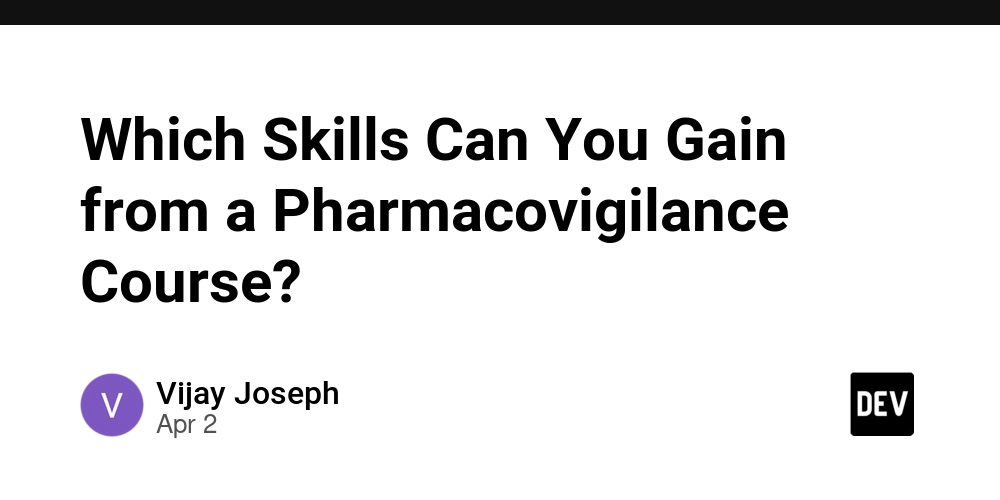Pharmacovigilance is critical to assuring medication safety and efficacy. It entails monitoring, analyzing, and preventing adverse drug reactions (ADRs) to improve patient safety. The pharmaceutical industry's rapid growth has increased the demand for competent pharmacovigilance personnel. Individuals interested in pursuing a career in pharmacovigilance can benefit from a well-structured course that gives vital knowledge and hands-on experience.
If you're considering taking a pharmacovigilance course, you might be wondering what skills you'll learn. The following are the major skills that a pharmacovigilance course can prepare you with:
- Understanding Drug Safety and Regulations
• Comprehensive knowledge of drug development and post-marketing surveillance.
• Familiarity with international regulatory guidelines such as ICH-GCP, FDA, EMA, WHO, and CDSCO.
• Understanding of pharmacovigilance laws and compliance requirements.https://www.technobridge.in/clinical-research-course
Adverse Event Reporting and Case Processing
• Learning how to identify, document, and report adverse drug reactions (ADRs).
• Hands-on experience in handling Individual Case Safety Reports (ICSRs).
• Understanding the importance of medical coding using MedDRA (Medical Dictionary for Regulatory Activities).https://www.technobridge.in/pharmacovigilance-coursesSignal Detection and Risk Management
• Developing analytical skills to identify safety signals and potential drug risks.
• Evaluating case studies to assess the seriousness and causality of adverse events.
• Implementing risk minimization strategies to ensure drug safety.Data Management and Documentation
• Gaining proficiency in using pharmacovigilance databases like Oracle Argus Safety and Veeva Vault.
• Mastering documentation techniques to maintain detailed and accurate records.
• Understanding the importance of data privacy and ethical reporting.https://www.technobridge.in/clinical-data-management-coursesMedical and Scientific Writing
• Developing skills to prepare safety reports, periodic safety update reports (PSURs), and risk management plans (RMPs).
• Writing clear and concise case narratives for regulatory submissions.
• Enhancing communication skills for effective scientific documentation.Communication and Team Collaboration
• Improving communication skills for effective interaction with healthcare professionals, regulatory authorities, and stakeholders.
• Learning how to work in cross-functional teams within pharmaceutical companies.
• Enhancing teamwork and problem-solving abilities to handle complex pharmacovigilance cases.Knowledge of Pharmacovigilance Systems and Tools
• Hands-on training in commonly used pharmacovigilance software.
• Understanding the integration of artificial intelligence (AI) in drug safety monitoring.
• Learning automation techniques for effective case processing and data analysis.https://www.technobridge.in/regulatory-affairs-coursesCritical Thinking and Decision-Making
• Developing analytical skills to assess drug safety reports critically.
• Learning how to interpret safety data and make informed decisions.
• Understanding regulatory expectations and making data-driven recommendations.Compliance and Quality Assurance
• Understanding quality assurance practices in pharmacovigilance.
• Learning about audits and inspections conducted by regulatory authorities.
• Ensuring compliance with global safety standards and ethical considerations.Career Growth and Industry Insights
• Gaining insights into career opportunities in pharmaceutical companies, CROs (Contract Research Organizations), and regulatory agencies.
• Understanding the various roles within pharmacovigilance, such as Drug Safety Associate, Pharmacovigilance Scientist, and Signal Detection Specialist.
• Staying updated with the latest advancements and trends in the pharmacovigilance industry.https://www.technobridge.in/medical-coding-course
Conclusion
A pharmacovigilance course teaches learners the technical and analytical abilities required to flourish in the field of drug safety. With an increasing demand for skilled pharmacovigilance specialists, developing skills in adverse event reporting, regulatory compliance, and risk management can lead to exciting employment prospects.

